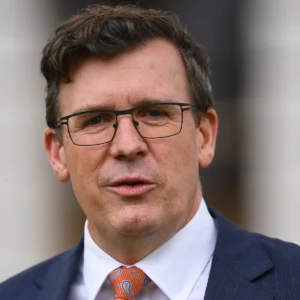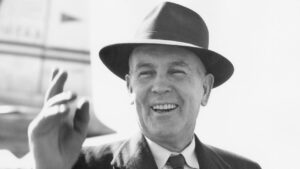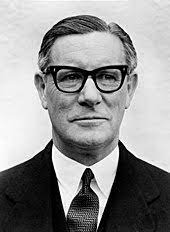Look, I’m not one for a Grudge …
To him, been just given the Nudge
I shall not, I will not, deliberately Fudge

Nor will I Budge
Yes, he said I did robotically Bludge
Then pushed me back into the poverty Sludge
Who? You guessed it, he was known as Alan Pakenham Tudge

Yes, some say he has left quite a Smudge
But whom am I to constructively Judge
As broken, defeated I onwardly Trudge
The Little Red Citroen
This is one prime example of the unexpected consequence. For years, when we have come to Tasmania, we hired a car. But with COVID and even before that, hiring cars was becoming prohibitively expensive in Tasmania, and at busy times of the years, the car hire companies introduced limits on the free kilometres.
Thus because of both this and increasingly wanting to stay longer in Tasmania at any one time, we made the decision to take the car ferry, the Spirit of Tasmania. Let’s say, that its disabled passenger cabin is excellent, even though it is a long corridor away from the lift, but the crew are solicitous, and one seems always at hand. On this occasion, travelling across from Melbourne to Devonport was uneventful, and we went down the West Coast to our property at Strahan.
When we decided to return, the rain had come to Northern Tasmania – flooding rains but some of the major roads remained open, even though much of the countryside was completely under water. However, the major unexpected consequence was that the level of the Mersey River at Devonport rose, floating the Spirit of Tasmania upwards, such that it was impossible to load cars and trucks. Therefore, with several cancelled ferries, and no confirmation of a new departure date for at least 48 hours, and a departure date delayed for effectively at least four days, we saw the uncertainty that bad weather introduces.
As we were due to go to Vietnam at the end of the week, we had no choice but to leave the car in Tasmania. Fortunately, we have good friends south of Hobart with space in their yard for a car. So we drove the car down from the North to their place, where we left the car and flew back to Sydney.

Fast forward a couple of weeks. Back in Sydney, preparing to travel to Tasmania to pick up the car. Then we were both laid low by a very nasty respiratory virus, not COVID, but may as well have been – how sick we both were. The upshot was that the car was marooned in Tasmania for another month.
Then “the cavalry” came to our rescue. Number two son said he was prepared to go and pick it up and bring it back to Melbourne – flight to Hobart, pick up the car our friends had conveniently left at the Hobart airport, then drive it to Devonport, overnight to the new Victorian Spirit of Tasmania destination, Geelong; thence up the Princes Highway and home.
By this time we were fit to travel, and as we had business in Albury, another friend offered to bring our car to Albury and meet us there. Number one son picked up the car, re-fuelled it and dropped it to our friend’s place. One-way hire of a modest sedan from Sydney to Albury cost about $1,000. Our friend having dropped our car returned to Melbourne by train, a trip which enabled him to read a book and which cost $20.
The exercise would have not been possible without this chain of friends and family. It makes us realise we are not alone on this planet – and we thank you all.
Medicare and the Constitution
Australia is consumed to a greater or lesser degree by the prospect of incorporating recognition of the Aboriginal people into the Constitution in a nebulous concept known as the Voice.
Meanwhile, the Government is flailing around wondering how to make Medicare work.
Medicare is made possible, because it is based on providing a range of patient benefits for a number of defined responsibilities.

In 1946 the following was passed in a referendum of the Australian people, an amendment to Section 51, namely:
(xxiiiA.) The provision of maternity allowances, widows’ pensions, child endowment, unemployment, pharmaceutical, sickness and hospital benefits, medical and dental services (but not so as to authorize any form of civil conscription), benefits to students and family allowances:
The Commonwealth does not have any constitutional power to regulate prices and incomes; and that is the greatest misunderstanding of how Medicare works. Hence doctors can charge what they believe is fair and reasonable; and only individual States can determine otherwise. Thus, of all health professionals, only doctors and dentists are able to receive Commonwealth funded patient benefits for their professional services. When the amendment was passed in 1946, the explosion of other health profession numbers had yet to occur, plus these professions being deemed to be in private practice. Patient benefits can only accrue to doctors working in private practice, although this has been systematically undermined by public hospitals “privatising” some of their clinics – in essence promoting double-dipping. Here the Commonwealth has been weak in its response.
In 1974, optometrists were given access to a limited patient benefits scheme where the profession accepted the benefit in effect as full payment; and they were deemed “medical” – a sleight of hand because at that time there was an unusually large number of optometrists as members of parliament. The other means of providing patient benefits is to provide a medically supervised patient benefit for a health professional group. In areas such as diagnostic imaging, radiotherapy and pathology, there has been a long term recognition that the benefit contains not only a professional component for the medical service but also the payment for technicians and scientists essential for the delivery of the services which are incorporated in the technical component of the medical benefit. The other component is the capital component, which acknowledges the level of capital expenditure to deliver the medical service. This last is a vexed question because it has not been universally agreed, and for instance, there is a separate list, from which prostheses are costed.
Recently, there is a clamour by various health professional groups for direct access to patient benefits, but despite the above stratagem, it should be ruled to be unconstitutional. As reported in the Persons with Disability and the Australian Constitution monograph, that:
In 1944, The {Pharmaceutical Benefits} Act was challenged by members of the Medical Society of Victoria with the support of the Attorney-General of that state. Publicly, the society objected to its members being co-opted into the scheme and having their professional judgment limited to only prescribing the free drugs from the Commonwealth scheme. The challenge before the High Court rested on two points. The first was whether the scheme that required doctors and chemists to act in accordance with the regulation was authorised by a legislative head of power in the Constitution. In short, did the Commonwealth have the power to regulate medical services? The second point was whether the Commonwealth scheme was in fact merely the appropriation and spending of funds authorised by the Parliament, and thus supported by the incidental powers under the Constitution.
The challenge was upheld by the High Court, but indirectly led to the future constitutional amendment in 1946. Effectively by adjudging the distribution of £30 million for the provision by the Commonwealth of free drugs to be unlawful constitutionally, it provided ammunition for that future constitutional amendment.
As a parenthetic comment, pharmaceutical benefits are directed towards providing a benefit to pay for medicines, and these are contained in the Pharmaceutical Benefits Schedule, not for pharmacists to provide independent professional services, however defined. This is a major pressure point, but it effectively confuses two roles. The pharmacist often knows more about the drug; the doctor, the reasons behind the prescription. Currently a pharmacist may provide health advice, for which there is no patient benefit. The doctor provides health advice for which there is patient benefit.
The pharmacists receive a patient benefit for dispensing medicines, their administration and the potential side-effects but not for dispensing health advice.

The Commonwealth Government has different means of handling this. Already it is strangling Medicare and effectively passing the funding as sickness benefits under the NDIS system. The Constitutional amendment by including “sickness benefits” codified Commonwealth funding in the disability sector. It is unfortunate but the AMA has been asleep at the wheel for decades, as the value of Medicare benefits to the patient has been eroded. In response, specialists have just raised their fees, devaluing in effect the value of the medical benefit. Increasingly, GPs have abandoned bulk billing and are charging fees that leave patients with significant co-payments over and above the patient Medicare benefit.
This solution is not that easy for general practitioners. They have been fooled because every time the Commonwealth initiates a review into Medicare, it just puts the whole question of increasing patient benefits on hold. Stratagems such as reducing time with patients, so the doctors time spent is little more than a greeting, a cursory look and then dismissal has been one response. As one wag jokingly said, in some practices, one doctor spent so little time with the patients that they had to be fit because they were required to jog through the surgery to sign the benefit form at the exit.
The central agencies shudder when they hear suggestions that all health professional services should attract a patient benefit – essentially an unlimited payment scheme only constrained by the Commonwealth’s willingness to ascribe a benefit. Currently, the Constitution stands in the way, but if judged by the legal challenge against pharmaceutical subsidy back in 1944, a referendum to change all that would surely be in the gunny sack of every populist Australian politician.
Ironically, amid this agitation, under the Constitution a dental benefits scheme could have been set up long ago. None has ever occurred, despite the concern over the dental health of the nation. Why? The dentists traditionally have not wanted it. This says something about the “influencer”.

Parramatta 1973
Back in September of that year there was a byelection. This was the first under the Whitlam Government and was caused by the resignation of the local member. This local member was Nigel Bowen who, after the 1972 election, had lost the leadership election of the parliamentary Liberal Party to Billy Snedden by one vote. In 1973, Bowen was appointed as Chief Judge in Equity in the Supreme Court of New South Wales. This meant his resignation from Parliament, thus precipitating a byelection. Nigel Bowen in 1964 was elected to Parliament to succeed Garfield Barwick, then on his way to be Chief Justice of the High Court of Australia. The Parramatta electorate at that time was “the Menzies gift”, as though he was propelling distinguished jurists into Federal parliament to emulate himself. It did not work out, although as Attorney General, Bowen produced some enlightened proposals, but not enough to be drafted in as Opposition leader.

As a distinguished jurist, facing years in Opposition, he decided to resume his career, not unexpectedly, especially as he was 61 years of age at the time. Snedden was fifteen years younger. For the Parramatta byelection, the Liberal Party preselected a young Liberal, direct from conservative casting, his father was a State MP, Philip Ruddock. Philip always danced from one end of the Party to other, but he had a certain resilience. He trounced his Labor Party challenger with a swing of nearly seven per cent. Ten other candidates, mostly independents, contested the seat.
This was the first Federal election in which eighteen-year-olds were eligible to vote, the voting age having been lowered from twenty-one earlier in the year.
As was expected Bowen did not involve himself in the campaign. Snedden did, and although he was a poor public speaker, he was a good grass roots politician. Whitlam on the other hand made a declamatory speech which canvassed the forthcoming prices and income referendum to be held later in the year. As with the by-election, this referendum was soundly defeated. It had been a triumph for Snedden and helped to consolidate his shaky hold on the Party, especially in NSW at that time.
Peter Dutton, the acclaimed Leader of the Liberal Party, is now faced with a by-election in the first year of a Labor Party government, as was Snedden. The recently retired member, Alan Tudge has been a conspicuously poor performer involved deeply in the Robodebt imbroglio. Let us say, he is hardly the person Nigel Bowen was. In 1973, Snedden was campaigning in NSW whereas his natural base was Victoria. Likewise, Dutton will be campaigning in Victoria, where his normal habitat is Queensland.
Nominally both Parramatta in 1973 and Aston in 2023 were and are safe Liberal seats. The expectation would be that the Opposition Party would achieve a swing as this is the expected outcome after the election, thus strengthening the hold on such electorates. In Parramatta in 1973, Ruddock achieved this swing, and had no need to go to preferences.
Dutton wants a female candidate. He’d better choose wisely, because I hate to see a dead bird floating among sheets of unread Murdoch papers – lose the byelection and you are a dead duck paddling, mate! It will be interesting to see if a wild duck, disguised as a teal is pre-selected. And what of the Labor Party? Can’t lose many feathers contesting; and as a bonus gives an idea of whether it has made inroads into the teal vote.
Thus, what of Aston, where, despite a swing against him at the 2022 election, Tudge held the seat comfortably. Can Dutton emulate Snedden?
ChatGPT – So you want to Cheat; go right ahead
Lawrence Shapiro is a professor of philosophy at the University of Wisconsin-Madison. He is coy about his age, but he received his PhD from the University of Pennsylvania in 1992, so he must be cognitively still vital.
He writes very calmly in the Washington Post about this artificial intelligence tool which has been heralded as a means of writing essays and assignments without even thinking about it – albeit a means of cheating.
This opinion piece is a very clear appraisal of the tool. He seems very relaxed. After all, he has recently published a second edition of his book Embodied Cognition which a reviewer has hailed as an outstanding introduction for those unfamiliar with but who would like to explore this movement. As the reviewer continues: It clarifies the very idea of embodiment, elaborates the central themes of embodied cognition, and evaluates theories of embodied cognition against standard cognitive science.
I think I will stick with this general appraisal.

ChatGPT has many of my university colleagues shaking in their Birkenstocks. This artificial-intelligence tool excels at producing grammatical and even insightful essays — just what we’re hoping to see from our undergraduates. How good is it, really? A friend asked ChatGPT to write an essay about “multiple realization.” This is an important topic in the course I teach on the philosophy of mind, having to do with the possibility that minds might be constructed in ways other than our own brains. The essay ran shorter than the assigned word count, but I would have given it an A grade. Apparently ChatGPT is good enough to create an A-level paper on a topic that’s hardly mainstream.
Universities are treating the threat as more dire than an epidemic or even a budget reduction. The most obvious response, and one that I suspect many professors will pursue, involves replacing the standard five-page paper assignment with an in-class exam. Others expect to continue with the papers but have suggested that the assigned topics should be revised to focus on lesser-known works or ideas about which a chatbot might not “know” too much.
Good luck with that. If ChatGPT can pen a solid essay on multiple realization, an issue on which I happen to be a world authority in good part thanks to lack of company, I doubt it would have difficulty constructing essays about lesser-known Shakespearean sonnets or unremarkable soldiers who fought for the Union Army. Besides, if we’re going to demand deep thought from our students, shouldn’t it be about the more important stuff?
Here’s what I plan to do about chatbots in my classes: pretty much nothing. Let me say first that as much as I value the substance of what I teach, realistically my students will not spend more than a semester thinking about it. It’s unlikely that Goldman Sachs or Leakey’s Plumbing or wherever my students end up will expect their employees to have a solid background in philosophy of mind. Far more likely is that the employees will be required to write a letter or an analysis or a white paper, and to do this they will need to know how to write effectively in the first place. This is the skill that I most hope to cultivate in my students, and I spend a lot of time reading their essays and providing them with comments that really do lead to improvements on subsequent assignments. In-class exams — the ChatGPT-induced alternative to writing assignments — are worthless when it comes to learning how to write, because no professor expects to see polished prose in such time-limited contexts.
I should emphasize just how desperately my students need formal instruction in writing. My wife confirms that I’m noticeably crankier than when I first started teaching 30 years ago. Everything today seems worse than it was back then: traffic, TV news, macaroni and cheese. But I don’t believe that the deterioration in writing quality that I see is a consequence of age-tinted glasses. I read too many papers from upperclassmen, from students who have taken other writing-intensive courses, in which only one sentence out of five is not grammatically or stylistically defective. I would be failing these students if I let ChatGPT discourage me from teaching them what might be the most essential competence they can gain from me.
But what about the cheaters, the students who let a chatbot do their writing for them? I say, who cares? In my normal class of about 28 students, I encounter one every few semesters whom I suspect of plagiarism. Let’s now say that the temptation to use chatbots for nefarious ends increases the number of cheaters to an (unrealistic) 20 percent. It makes no sense to me that I should deprive 22 students who can richly benefit from having to write papers only to prevent the other six from cheating (some of whom might have cheated even without the help of a chatbot).
Here’s an idea for extracting something positive from the inevitable prominence that chatbots will achieve in coming years. My students and I can spend some class time critically appraising a chatbot-generated essay, revealing its shortcomings and deconstructing its strengths. This exercise would bring a couple of rewards. First, analytical writing, like any skill, benefits from seeing examples of what works and what does not. While students might reasonably object to having their own essays made a target of public inspection, chatbots couldn’t possibly care. Second, given that chatbots are not going to fade away, my students might as well learn how to refine their products for whatever uses the future holds.
I urge my colleagues not to abandon writing assignments for fear that some students will let artificial intelligence do their work for them. Instead, let’s devise ways to make chatbots work for all of us. Truly, the cheaters are only hurting themselves — unless we respond to them by removing writing assignments from the syllabus.

Mouse Whisper
He has been reading this book The Amur River which relates to Colin Thubron’s recent travel from Mongolia, reaching towards and eventually along the Amur River which divides Russia from China to its mouth. Fascinating book, he announced to all and sundry, and me. He could not refrain from telling us about Kim-Jong-Il, the original poisonous North Korean puffball. Kim-Jong-Il was not born in some celestial nursery but in a tiny Russian village near the Amur River and was swept up in fighting the Japanese. But Thubron recounted this description of this high born North Korean dictator – his tastes I doubt were developed along the Amur. How, I ask you do such nutters get these gigs – no mouse would ever be allowed to indulge in such a display? {Sic}
Despite his propaganda, he was mundanely earthbound, and frightened of flying. He travelled only in a luxury carriage of his own armoured train. On a secret journey to Moscow, his Soviet escort described him eating fresh lobsters airlifted in every day, with roast donkey and champagne, while his people starved.










 Seriously, we forget the time saved by the modern razors, and as long as one does not use the same one more than 24 times, then it gives the facies a very close approximation to a member of human race, unlike those who bury their jaws in home grown hedges.
Seriously, we forget the time saved by the modern razors, and as long as one does not use the same one more than 24 times, then it gives the facies a very close approximation to a member of human race, unlike those who bury their jaws in home grown hedges.